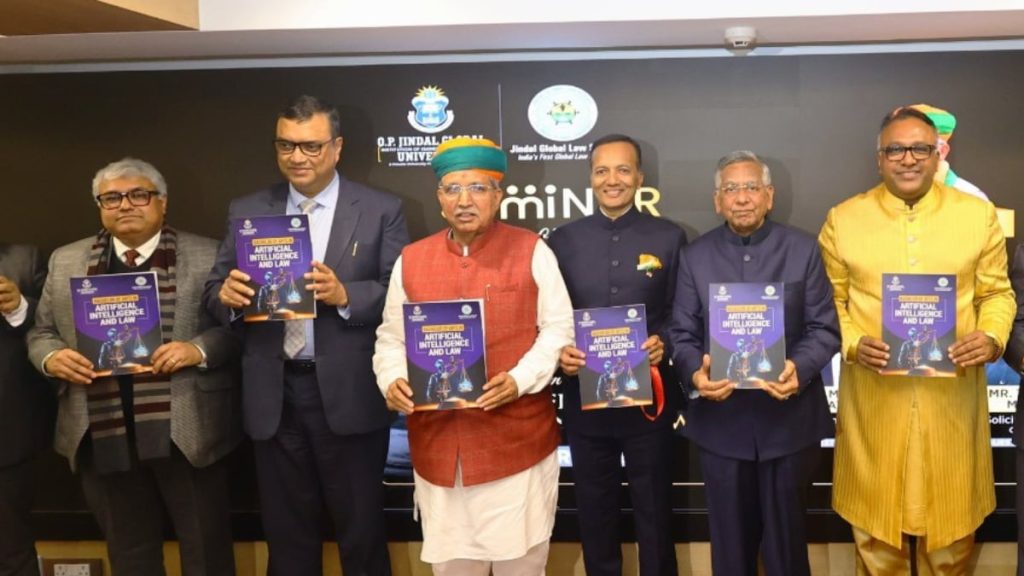Last Updated:
Jindal Global Law School launched India’s first BA course in AI and Law which aims at bridging technology and legal education.

Union Minister Arjun Ram Meghwal launches India’s first BA programme in Artificial Intelligence and law during Seminar on AI & Law organised by Jindal Global Law School.
Union Minister for Law and Justice Arjun Ram Meghwal on Friday launched India’s first-ever Bachelor of Arts (BA) programme in Artificial Intelligence (AI) and Law at Jindal Global Law School (JGLS), OP Jindal Global University (JGU). The historic announcement was made during a seminar on “Artificial Intelligence and Law.”
Highlighting AI’s potential in resolving issues such as pending court cases and aiding translations Meghwal said, “We are living in the 21st century, and regressing is not an option. We must embrace the present and focus on how to use technology effectively while addressing its challenges.” The Minister also addressed concerns about the ethical use of AI, particularly concerning data privacy and security.
The seminar, which brought together leading legal scholars, policymakers, and industry experts, explored the intersection of AI and law—an evolving field that promises to reshape the legal landscape. The event also saw the participation of JGU’s founding Chancellor and Member of Parliament, Naveen Jindal, as well as other prominent figures in law and technology.
The seminar explored the intersection of AI and law, with the newly launched B.A. programme designed to bridge the gap between technology and the legal profession. This pioneering course aims to equip students with a deep understanding of both AI technologies and legal principles, preparing them for careers in AI policy-making, compliance, and legal ethics.
Prof (Dr) C Raj Kumar, Founding Vice Chancellor of OP Jindal Global University, underlined the significance of AI in transforming the legal domain. He identified five key implications of AI for global legal practices, including enhancing legal analytics, addressing AI biases, and tackling cybersecurity challenges. He also emphasised AI’s potential to assist in cross-border dispute resolution and automated law enforcement, while also noting the ethical concerns regarding AI systems inheriting biases.
Kumar further explained that AI could improve access to justice through innovations such as online dispute resolution, but cautioned that the digital divide could exacerbate existing inequities, especially in rural areas. “The complexities of regulating AI require clear policies that balance innovation with accountability,” he remarked.
Justice Dipankar Dutta of the Supreme Court of India remarked on the uncertainty surrounding AI’s impact on the legal profession, stating that while AI’s potential to revolutionise legal services is clear, its ultimate effect remains to be seen.
Attorney General for India, Venkataramani, and Solicitor General of India, Tushar Mehta, also contributed to the discussions on the evolving relationship between law and technology. Mehta emphasised the irreplaceable role of human judgement in legal decision-making, stressing that while AI may advance, it cannot replicate the nuanced understanding that human judges bring to the table.
Senior Advocate Dr Abhishek Manu Singhvi echoed the sentiment, stressing that AI should remain a tool that complements, rather than replaces, legal professionals. “AI must remain an efficient and obedient servant,” he said, urging the legal community to meet the challenges posed by AI while harnessing its potential to advance justice.
“While AI presents significant challenges to the legal field these challenges are not insurmountable and they must be met, for us to absorb, integrate and introduce AI into our system by fostering transparency, addressing bias, implementing robust regulations. By viewing AI as a complementary tool rather than a replacement, we can harness the humungous potential of AI to advance justice,” he said.
Professor (Dr) SG Sreejith, Executive Dean of JGLS, elaborated on the vision for the new programme, noting that students will gain valuable insights into societal changes and the future of law, preparing them to shape their futures.





